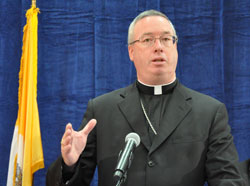Administrator has most duties and authority of an archbishop

Bishop Christopher J. Coyne speaks during the Sept. 21 press conference announcing Archbishop Daniel M. Buechlein’s retirement from active ministry. Pope Benedict XVI appointed Bishop Coyne the archdiocese’s apostolic administrator. (Photo by Mary Ann Garber)
By Sean Gallagher
When Pope Benedict XVI granted permission on Sept. 21 to Archbishop Daniel M. Buechlein to retire as the leader of the Archdiocese of Indianapolis, he also appointed Bishop Christopher J. Coyne as its apostolic administrator until he selects a new archbishop.
Staff members of the archdiocese’s Metropolitan Tribunal prepared a memorandum to explain the responsibilities of Bishop Coyne, and the limits placed on his authority given that there is currently no archbishop to lead the Church in central and southern Indiana.
They did this because the Church’s Code of Canon Law sets forth the administrator’s responsibilities and limited authority.
The following is a summary of the information that members of the Metropolitan Tribunal shared.
They note that the Code of Canon Law mandates that an interim diocesan administrator be appointed after a diocesan bishop either dies, resigns, is re-assigned or is removed from his ministry by the pope.
This appointment can happen either by the election of an administrator by a body of diocesan priests, known as the College of Consultors, or a direct appointment by the pope.
In the current case, Bishop Coyne was appointed by Pope Benedict and, because of that, is apostolic administrator of the archdiocese.
According to members of the Metropolitan Tribunal, Bishop Coyne, as apostolic administrator, “is subject to the same obligations and possesses the same powers as a diocesan bishop.
“However, there are certain limitations on the power of the administrator that hinge upon his status.”
These limits often require the administrator to seek the consent of the College of Consultors before taking certain actions, including issuing letters authorizing the ordination of deacons or priests for the archdiocese.
The administrator is also prohibited by canon law from naming pastors of parishes. However, he is given authority to appoint pastors if no archbishop is named within a year of Archbishop Buechlein’s retirement.
Canon law also prohibits the administrator from closing parishes or relegating churches to secular uses.
“In general,” members of the Metropolitan Tribunal state, “the diocesan administrator, whether elected by the college of consultors or appointed by the Holy Father, maintains the necessary day-to-day functioning of a diocese, but does not make any structural changes that would truly be innovations in the particular diocese.”
“It’s an assurance that there is a leader still,” said Father James Bonke, defender of the bond in the Metropolitan Tribunal, of the Code of Canon Law’s provisions regarding diocesan administrators.
“Even though there’s not an archbishop on the scene, it’s not that we’re without a shepherd. We do have a shepherd. And it is [Bishop] Christopher Coyne. He doesn’t have the title ‘archbishop,’ but he is apostolic administrator.” †
Click here to read the memorandum regarding the archdiocesan administrator written by staff members of the Metropolitan Tribunal.
